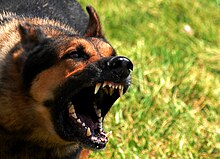
Dog aggression expressed by dogs is considered to be normal behaviour and various types of aggression are influenced by a dog's environment and genetic predisposition.[1] Dogs commonly display possessive aggression when defending resources or themselves.[2]
Canine aggression may be influenced by a dog's age, sex, health and reproductive status.[3] Canine aggression is one of the most serious behavior problems in animal behavioral medical science.[4] Aggression in canines is particularly important because a dog's sharp teeth can result in serious injuries,[4] or even fatalities in the young or frail.
The determinants for each type of aggression are different, but there are specific factors that are common to canine aggression.[4] The types of aggression include dominance aggression, defensive aggression, predatory aggression and maternal aggression. Aggression in canines may be a self-defense response to a person or animal entering a dog's space,[5] which may be ritualized aggression, not actual aggression, if the violation includes a threat. Aggressive behavior in scared dogs is typically not true aggression but rather ritualized behavior intended to avoid physical altercation by way of faking aggression[6] rather than actual aggression, anxiety disorder, diet, gut microbiome or genetic background. Some aggression can be treated through animal behaviour therapy or avoided by proper socialization during puppyhood.
- ^ Jacobs, C.; De Keuster, T.; Simoens, P. (June 2003). "Assessing the pathological extent of aggressive behaviour in dogs. A review of the literature". Veterinary Quarterly. 25 (2): 53–60. doi:10.1080/01652176.2003.9695145. PMID 12854682.
- ^ Jacobs, Jacquelyn A.; Coe, Jason B.; Widowski, Tina M.; Pearl, David L.; Niel, Lee (June 11, 2018). "Defining and Clarifying the Terms Canine Possessive Aggression and Resource Guarding: A Study of Expert Opinion". Frontiers in Veterinary Science. 5: 115. doi:10.3389/fvets.2018.00115. PMC 6004413. PMID 29942810.
- ^ Lockwood, Randall (1995). "The ethology and epidemiology of canine aggression". In Serpell, James (ed.). The Domestic Dog: Its Evolution, Behaviour and Interactions with People. Cambridge University Press. pp. 131–138. ISBN 978-0-521-42537-7.
- ^ a b c Arata, Sayaka; Takeuchi, Yukari; Inoue, Mai; Mori, Yuji (June 27, 2014). "'Reactivity to Stimuli' Is a Temperamental Factor Contributing to Canine Aggression". PLOS ONE. 9 (6): e100767. Bibcode:2014PLoSO...9j0767A. doi:10.1371/journal.pone.0100767. PMC 4074066. PMID 24972077.
- ^ Frank, Diane (2013). "Aggressive dogs: What questions do we need to ask?". The Canadian Veterinary Journal. 54 (6): 554–556. PMC 3659447. PMID 24155444.
- ^ "Display behaviour | animal behaviour". Encyclopedia Britannica.